- Available now
- New kids additions
- New teen additions
- The New York Times 100 Best Books of the 20th Century
- Romantasy for Adults
- 2024 Adult Fiction Series Starters
- Beach Reads 2024
- Rom Com Reads: Standalones or First in a Series
- Stand Alone Thrillers
- Historical Fiction & Mysteries: First in the Series
- Won't You Be My Neighbor?
- Stand-Alone Science Fiction Novels
- Award-Winning Science Fiction & Fantasy
- See all ebooks collections
- Available now
- New audiobook additions
- New kids additions
- New teen additions
- Most popular
- See all audiobooks collections



